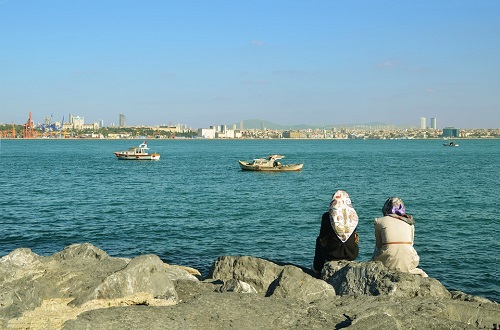Moving to a far off land can be as daunting a prospect as it is exciting. If you are expecting to see nothing but sand dunes and camels everywhere you look when you move to the Middle East, you are in for a huge surprise. There is a lot more to this transcontinental region than people realize.
While this is one of the most ancient places on the globe, it has evolved greatly over the last few decades. Many of the nations in this region have high levels of infrastructure, healthcare, economy, education and overall standards of living.The Gulf has become a magnet for people from all over the world because of the educational, career, and business opportunities it has to offer. Data show that expats now account for more than 48% of the population in Gulf countries.
It is very difficult to generalize the traditions, lifestyle and language of the people in the Middle East because of how diverse everything is. Several countries from across Western Asia, Southeastern Europe and North Africa are regarded as a part of the Middle East. These include Bahrain, Cyprus, Egypt, Iran, Iraq, Israel, Jordan, Kuwait, Lebanon, Northern Cyprus, Oman, Palestine, Qatar, the Kingdom of Saudi Arabia (KSA or Saudi Arabia), Syria, Turkey, The United Arab Emirates (UAE), and Yemen.
Apprehensions about moving to the Middle East are generally higher among women, which is only natural, considering how a few of the countries listed above have a different set of rules for different genders. However, it is important to remember that not all these places have the same laws. Countries like Turkey, the UAE and Kuwait are extremely modern and most expat women here face no difficulties at all in adjusting to their new homes. They can get jobs, wear what they like, drive and move around independently, just like they would back home. Moreover, the laws in these nations generally tend to be quite strict, which has made them relatively safe for the female population.
However, women from Europe, North America and certain parts of Asia will probably have to make changes in their lifestyle if they move to places such as Saudi Arabia, where women are required to dress conservatively and have to be escorted by a male family member when leaving the house.

Unfortunately, there is an unofficial ban on female drivers, making it the only country where women (including expats) are not allowed to drive. Ironically, a woman has the right to own a car but cannot drive it. Though there is no formal law that makes it illegal for women to drive a car, the cops can arrest a woman who is seated at the steering wheel.
Statistics show that around 53% of expatriates around the world are female. This indicates that women are successfully building their lives and careers in the global arena. However, the percentage drops significantly, to around 35%, if you look at the Middle East alone. Of this, the ratio is much higher in the UAE and Qatar compared to the other countries. In fact, the there is a huge difference in the expat male:female ratio across the entire region. Where the global average stands at 47:53, the UAE’s is 63:37, Qatar’s is 64:36 & Saudi Arabia’s is 76:24.
If you are planning to move to this region, do first think about the kinds of lifestyle changes you will be expected to make. While some women have seen a huge improvement in the quality and standard of their lives, others have not been able to make a successful transition. Either way, be prepared to experience a major culture shock.
Below are some of the different aspects to keep in mind, along with a few tips from female expatriates who have already taken the step and have been living in the Middle East for a while now.
Status in Society
Since the early part of the 20th century, there have been reforms in the legal status of women in this region. Today, customary laws, Islamic laws and imported Western laws can apply to the female population in varying degrees. In most of the Gulf countries, women are no longer treated as second-class citizens; unfortunately however, their status is still not equivalent to men. You will still see a significant amount of inequality between genders, especially in places like Jordan, Iraq, Egypt and Oman.
While the legal issues involving the status of women are quite different from those in the Western world, you will now find female-oriented movements and organizations across various parts of the Middle East.
Dress Codes
“Modesty” is the best policy to go by when it comes to dressing, no matter which Middle Eastern country you live in. Many western women actually struggle with this transition, since they cannot wear shorts, halter necks and crop tops as freely as they could back home. The heat only makes matters worse!
In most of these nations, the general rule is to keep the shoulders and knees covered at all times when leaving the house. The local people are not used to seeing women with bare arms and legs, which may cause them to stare and make you uncomfortable. In the more conservative countries like Iran and Iraq, you may also have to cover up your wrists, ankles and head. In a few places, women are not allowed to leave the house without wearing a niqab or veil.

In the UAE, women often don the same clothes they would at home when they are at a nightclub or at the beach. It is a good idea to have a scarf and jacket handy at all times though, in case you enter a more conservative area.
Safety and Security
The media often talk about barbaric acts and crime against women who live in the Middle East. However, a number of female expats admit that they feel safer in some of the Gulf countries than they did back home, since crime rates are relatively low. Statistically, rape is rare, though the actual number of cases may be higher than those that are reported.
Of course, there are a few caveats: while the rate of assaults may be low, harassment is not uncommon. Unescorted women often find themselves being followed, even in crowded areas like malls, markets and hotels. Some men may be bold enough to touch you and if that happens, don’t get scared and run away, as it will only encourage them. Make a big fuss by raising your voice and gather a crowd if possible to get the assailant to leave you alone.
To some extent, the way people behave with you will also depend on the manner in which you dress. It is therefore best to stay modestly covered up at all times.
Working
The Middle East offers great career opportunities, higher wages, tax-free incomes, and excellent conditions, not just to men but also women. In Qatar and the UAE, female employees are increasingly making their mark in all sectors and at all positions, including government jobs. Women with the right qualifications and experience can find high-paying jobs in senior positions across any industry. For the first time in its history, Saudi Arabia is also encouraging the female population to join the workforce.

If your company is sending you to a Middle Eastern country, things will be a lot easier, since they will arrange for your paperwork. However, if that is not the case, make sure that you only take up an opportunity if your employer is willing to sponsor your work permit. The last thing you want to do is take up a job and then have to come back home in a few months. Exit permits should also be discussed with your employers in detail beforehand.
Women who are living in the Middle East on a dependent visa are not permitted to work unless their employers agree to sponsor their work permit.
Accommodation
Many employers in the Middle East offer housing as one of the perks to expat employees. However, this is more likely to be given to a male manager than a female. If you are moving to the Middle East on your own, it is best to get your accommodation arrangements sorted before you board the plane.
Finding an apartment to lease is quite easy in most of the Middle Eastern countries, even for women, especially if you are willing to share the premises with a few other people. Due to a high demand for accommodation, however, rents tend to be expensive.
Healthcare and Insurance
You will find a variety of public and private healthcare services in most of the Middle Eastern countries. The quality of medical care in Kuwait, the UAE, Qatar, Cyprus and Jordan is on par with Europe and North America. In places like Oman and Bahrain, emergency services are free.
However, as an expat you will be expected to pay for any treatment you receive, even in public facilities. Since the cost of medical services is quite high, it is best to have health insurance included in your package when negotiating with your employer. Do remember that governments of the Gulf countries have not made it mandatory for companies to have their employees covered under health insurance. A number of expats therefore choose to get a personal health insurance cover for themselves and their families.
Customs and Traditions
Regardless of which country you move to, sooner or later you will be expected to adapt to their way of life, especially if you want to integrate yourself into the society. This does not mean that you have to follow all their customs and traditions; just be mindful of them. This includes showing respect towards the local religion, beliefs, dress code, family values and laws, no matter how difficult that may seem.

For example, it is possible for you to buy alcohol in some of the Gulf nations but you will need a license to do so. While these countries don’t make it illegal for residents to consume liquor, the law does have strict penalties for those who misbehave or drink and drive. Similarly, while you can purchase pork in some places, never make the mistake of offering it to the locals.
Ramadan, the ninth month of the Hijri calendar, is one of the most pious and auspicious occasions all over the land. Even non-Muslims are expected to follow certain practices and behaviors during this month, mainly during the daylight hours. Make sure that you do not:
• Eat, drink or smoke in public areas
• Offer food or drink to anyone (except a child, elderly person or pregnant woman)
• Play loud music, dance or disturb people around you (nightclubs are usually shut during Ramadan)
• Display acts of affection towards members of the opposite gender.
Socializing and Meeting People
The residents of the UAE, Kuwait and Qatar are known to lead very active social lives, as these countries are full of tourist attractions, restaurants, bars, cafes, clubs, museums, parks, and picnic spots. Expat communities are also known to celebrate special occasions together, though the festivities are quite low-key.
Dating in the Middle East is likely to be a bit of a tricky affair. Some of the countries have laws against non-marital physical relationships and it is against the law for you to live with a man who is not your husband. The local authorities are not tolerant about same-sex relationships either. While you can go out on a date, it is best to avoid any public displays of affection.
Some single expat women claim that Middle Eastern men are more than happy to date a foreigner but will not think about anything serious with an expat.
Are you a female expat who’s lived in the Middle East? Share your thoughts below, or answer the questions here to be featured in an interview!

